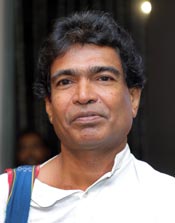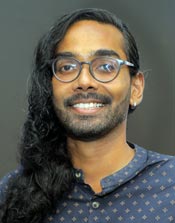Arts
A novel born in a gas queue
 Lal Medawattegedera in his new novel When Ghosts Die, rouses an Aragalaya in the Kanatte. Called Maragalaya it is a rebellion by dead spirits to oust the dead politicians from the exclusive cemetery.
Lal Medawattegedera in his new novel When Ghosts Die, rouses an Aragalaya in the Kanatte. Called Maragalaya it is a rebellion by dead spirits to oust the dead politicians from the exclusive cemetery.
“An urn, a teapot and an extraordinarily ordinary woman called Mandara gain unexpected significance. The urn (predictably) carries ashes, hijacked from the dead; and the teapot—shhhh! Things that should not be uttered. The nation’s patriotic politicians must stop this urn from reaching Piduruthalagala—will they? And the teapot must be snatched from Mandara now—can they?
Perhaps. Perhaps. Perhaps.”
It is Sri Lanka’s ‘highly questionable’ political culture and the unwitting participation of some section of the Lankan society in this culture that inspired the novel.
“Also, the human vulnerabilities when it comes to power and prestige; and the tendency of Lankan power holders to scaffold themselves with mindless superstition. Most importantly, the notion of blurring the lines between the living and the dead—we tend to hold the dead sacred and become passionately respectful in a cemetery. We become speechless at a funeral. Perhaps we unconsciously think that the ‘dead’ have transcended the petty concerns in the living sphere; that they are in a sphere of light and have become better than us—have they?”
Lal avows that he is much inspired to write his alter universe novels by Sir Terry Pratchett. Pratchett too blurs the lines between life and death- with serious subtlety so that one doesn’t notice the difference.
“His rickety and disciplined Reaper is adorable and ultra-efficient. Like me, Sir TP is irreverent to both life and death… I have a long way to go before I will write like (him).”
The idea of When Ghosts Die was born in a gas queue. “Fragments of ideas got lodged in my brain and created a situation akin to a trauma. This situation altered my blood circulation and disrupted the sane spaces of my consciousness—if there are such spaces that is”.
This roller coaster of a novel is woven of many themes: claustrophobia and corruption of the Lankan political system; inability of some people to transcend the political system and moderate it; extreme dependency of power politics on superstition, talisman, and soothsayers; inability of superstition to mitigate greed and inevitable fear brought on by greed; healing touch of romantic love; the importance of treating your teapot with respect; the importance of reading novels.
“My novel is highly irreverent… I think, since I write about politics, human vulnerability and primordial fears—perhaps I imitated those events—events of politics, vulnerability and fear are rude and restless actions which evades expression via a system of language governed by grammar. (That is why the same people who decry those events also subscribe to them). When Ghosts Die represents ‘realities’ that cannot be captured into a known form of expression very easily.”
Getting to know a land of contradictions
 A Passing Return is a book that defies classification. When Pasan Jayasinghe entered it for the Gratiaen he was unsure whether to bill it as memoir, travelogue or ‘literary non-fiction’.
A Passing Return is a book that defies classification. When Pasan Jayasinghe entered it for the Gratiaen he was unsure whether to bill it as memoir, travelogue or ‘literary non-fiction’.
The book quite simply was born as a bemused Pasan tried to record from 2017 the impressions he found strange as he settled down to island life after 15 years in New Zealand. They were his first adult impressions of Lanka, and he gathered them assiduously.
Pasan originally grew up in Godagama and schooled at Subharathi Vidyalaya, Isipathana College and Ananda College.
After completing a doctorate in political science at University College London, he is now a visiting lecturer at the University of Colombo, and has previously worked as a policy advisor, legal researcher and election monitor.
“Things that jarred” back home included people’s thresholds for violence and how they tend to avoid talking about history. But there were positive impressions too- like how he realized we as a nation are ‘warmer and community-minded’.
“But” he says “the book is about recounting new places for me as well – for example, I had never been anywhere north of Anuradhapura until I came back”.
An early inspiration for A Passing Return was Running in the Family, Michael Ondaatje’s popular book where he returns to the modern
avatar of the palmy colonial Ceylon he knew. “But over time the book morphed into something very different, and I think they both have fundamentally distinct kinds of gears ticking away underneath.”
The main conclusion Pasan arrives at in the book is that “it’s hard to come to conclusions about Sri Lanka”.
“This place carries far too many contradictions for there to ever be any neat resolutions, especially when you look at the horrendous things we have inflicted on each other and have allowed to be inflicted in our names. But I think that definitely doesn’t mean we should avoid thinking about those contradictions though or sifting through their effects as best as
we can – people live their lives in
the contradictions.”
Asked if he would venture on a more literary endeavour Pasan says:
“I have dabbled in fiction before; have tried my hand at short stories and have vague ideas for a novel or two. But the main focus for now is getting this book published, after which maybe other pastures will reveal themselves more clearly. Poetry remains at the highest and unreachable levels of the ‘literary’
for me, I’m afraid!”
Searching for an ideal partner? Find your soul mate on Hitad.lk, Sri Lanka's favourite marriage proposals page. With Hitad.lk matrimonial advertisements you have access to thousands of ads from potential suitors who are looking for someone just like you.


